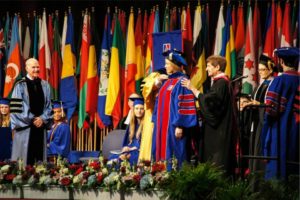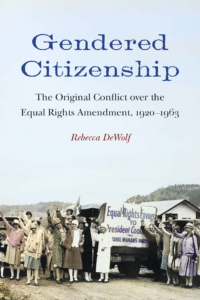
Before she earned her Ph.D. in history, AU alum Rebecca DeWolf poured her time and energy into politics. Prior to pursuing on a master’s degree in early modern European History at George Washington University, DeWolf worked on several political campaigns, including then Senator Hillary Clinton’s re-election bid to the Senate in 2005–6. But it was a desire to gain a better understanding of the origins and development of major political issues that inspired her to pursue a Ph.D. at AU.
In her first year as a graduate student, DeWolf discovered her passion for research and teaching. “I had the great luck of being a teaching and research assistant for Dr. Allan Lichtman,” she said. “He taught me great techniques in how to teach history and how to give great lectures.” Outside of the classroom, DeWolf was able to gain valuable research experience by accompanying Prof. Lichtman to the manuscript room in the Library of Congress. “What he showed me was how to do archival work from a historian’s point of view,” DeWolf recalls. “He showed me how to go through massive amounts of collections and how to take notes, organize them, and develop an analysis. It was because of him that I came to the ERA.”

The ERA is the Equal Rights Amendment. First introduced to Congress in 1923, the ERA was intended to eliminate legal distinctions between men and women in many areas of daily life, including employment, divorce, property rights, and other matters. DeWolf first became interested in the history of ERA political debates when Dr. Lichtman asked her to give a guest lecture on the topic to his undergraduate students. She was surprised to learn that many students did not seem to be aware of the implications of the amendment or its relevance to their daily lives.

As a result, she decided to write a dissertation on the complex history of political opposition and support for the ERA. She then revised her dissertation in a book, Gendered Citizenship: The Original Conflict over the Equal Rights Amendment, 1920–1963, which was published in 2021 by University of Nebraska Press. It has already been met with rave reviews, with DeWolf in high demand for media interviews. “Media depictions of the ERA debate often portray it as if it was some sort of catfight among women,” DeWolf said. “But the political coalitions were once much more diverse on both sides than they are now, and the role of men is all too often written out of the narrative.”
DeWolf hopes that her book will educate people of all political persuasions about the nuanced history of the ERA and its prospects for the future. “I didn’t write this book to necessarily push people to support the ERA,” she said, “but rather to help people understand the political and gendered implications of their arguments, why people think the way that they do, and why things played out the way they did.” In addition to her research on the ERA, DeWolf is also active as a public media figure, maintaining an online blog (Out of the Tower) and frequently offering her perspective on current political issues related to women’s rights. She still resides in the Washington, D.C. area and is currently formulating a second research project on Elsie Hill, a leading suffragist in the twentieth century who played a vital role in the drafting of the ERA in 1921.